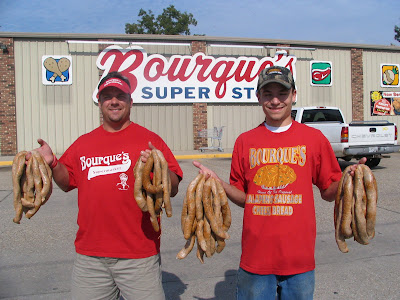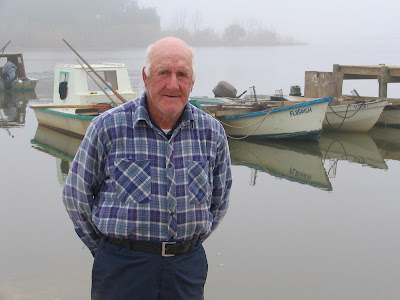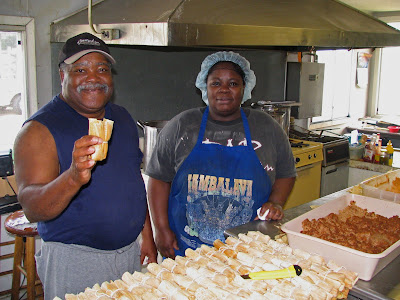Southern Foodways Alliance: Celebrating Food Cultures of the South
We've got an extraordinary resource for you travel foodies today! The Southern Foodways Alliance is a gem, started as a non-profit, and was begun at the Center for the Study of Southern Culture at the University of Mississippi. The SFA History notes that "Two organizations with similar aims preceded the SFA: The Society for the Preservation and Revitalization of Southern Food, spearheaded by Edna Lewis and Scott Peacock. And the American Southern Food Institute, led by, among others, Jeanne Voltz. Soon after the SFA was established, both organizations folded their member rolls and cash reserves into the SFA." The range of people involved in the SFA is incredible.
What I am most impressed about is the depth of commitment to local foods - and promoting them in a variety of ways. We were lucky enough to sit down and talk with Amy Evans Streeter, Oral Historian of the Southern Foodways Alliance, about SFA, what's available on the blog, maps, publications, events, and more. Here's what she had to say...
WE: Please tell us about your site, the Southern Foodways Alliance...
AES: The Southern Foodways Alliance, which was formed in 1999, documents, studies, and celebrates the diverse food cultures of the changing American South.
We stage symposia on food culture, produce documentary films, publish compendiums of great writing, and—perhaps most importantly—preserve, promote, and chronicle our region’s culinary standard bearers. We’re talking white tablecloth chefs and fried chicken cooks, barbecue pitmasters and peanut farmers.
The SFA is a member-supported organization of more than 800 people. Chefs and academics, writers and eaters: all are active participants. Though we are a lean and efficient organization, our work has great impact. In the Atlantic Monthly, Corby Kummer dubbed the SFA “this country’s most intellectually engaged food society.”
We use our website as a way to keep members informed about upcoming SFA events held throughout the region, but our website's most important role is that of online archive for our almost 500 oral history interviews that document Southern food and the people who grow, cook, serve and eat it.

Shannon and Chad Bourque (cousins) of Bourque's Supermarket in Port Barre, LA. Link to their oral history: http://www.southernfoodways.org/interview/bourques-supermarket/
WE: What was the genesis of your site?
AES: Originally, southernfoodways.org was a simple tool used to keep members informed of general information and upcoming SFA events. In 2002, when the SFA dedicated itself to collecting the stories behind the food, the website became the main tool for sharing those stories. When the SFA established its oral history initiative, it was very important from the start to make the interviews available online, rather than relegate them to a file cabinet in the university's formal archives, where they would only be available to scholars. Eight years, 25 films and almost 500 oral history interviews later, our entire archive can be accessed online. The SFA does deposit original materials in its permanent archive, which is located at Archives & Special Collections on the University of Mississippi campus.

A. L. Quick: Lifelong oysterman, Apalachicola, FL. Link to his oral history: http://www.southernfoodways.org/documentary/oh/florida_forgotton_coast/AL_Quick.shtml
WE: What sort of information is available on your blog?
AES: Our blog is a forum for the SFA to post current news about upcoming SFA events, to announce other events hosted by SFA members and held throughout the region, highlight oral history subjects from our archive, announce new documentary projects, and share information about Southern food that is relevant to our mission.

Florence Signa of Doe's Eat Place in Greenville, MS. Link to her oral history: http://www.southernfoodways.org/interview/florence-signa/
WE: Food and travel go hand-in-hand together. And southern food is so unique - who are your members and readers?
AES: The SFA is a member-supported organization of more than 800 people. Chefs and academics, writers and eaters: all are active participants. And not all are Southern. Our membership spans the country and the globe.

John Williams, Jr. and his daughter making tamales, Cleveland, MS. Link to his oral history: http://www.tamaletrail.com/OH_johns.shtml
WE: Please tell us about your publications - and where we can buy them!
AES: The SFA produces a variety of publications:
GRAVY: A FOODLETTER
Gravy is a quarterly publication sent to current SFA members via regular mail. Archived copies are available for download on our website.
THE CORNBREAD NATION SERIES
An annual book series that is a collection of the best writing on Southern food. Each volume has its own theme. The current volume, Cornbread Nation 5, which just came out this month, celebrates food and the ways in which it forges relationships between peoples and places. In more than seventy essays and poems, readers learn how food provides nourishment, but also of how foodways define community and shared history.
SFA COMMUNITY COOKBOOK
A collection of recipes from our esteemed membership and oral history subjects. Publication date of October 2010.
WE: What sort of events do you put on?
AES: The SFA stages an annual symposium on the University of Mississippi campus that is held each October. During these annual gatherings we examine the state of Southern food. (Southern drink gets its due, too.) Each year celebrates a different theme; this year's theme is the Global South. We ponder where we have been. And where we are going. We assay our field of study. And think critically about the SFA’s role in documenting and celebrating the diverse food cultures of the American South. We pay homage to the subjects of our oral history initiative. We repay debts of pleasure earned over generations.
In advance of the symposium, the SFA also organizes an annual field trip to explore a location that is in keeping with the fall symposium's theme. For example, this fall's symposium theme is the Global South, and this summer we will take a group to Atlanta to explore the Buford Highway International Corridor.
We also having a roving Potlikker Film Festival, which showcases SFA films in locations throughout the South. The festival also includes local food, drink and films.
WE: You've got great interactive maps, with excellent places to eat and oral histories. Can you please share more about this?
AES: The interactive map is our most recent addition to southernfoodways.org. We always intended for our online oral history archive to inspire people to hit the road to seek out authentic eating experiences, and we've realized that dream completely with this interactive map feature. Each one of our oral history subject locations are included on the map with links to the interviews, as well as contact information for each place. Users are able to build custom road trips using the tools available on the site.
We have also added interactive maps to our four TRAIL projects: The Southern BBQ Trail, Southern Gumbo Trail, Southern Boudin Trail, and the Mississippi Delta Hot Tamale Trail.
WE: Is there anything else you'd like to share with us?
AES: We'll soon collect our 500th oral history. And we'll make our 25th film,
We've created a modern day WPA survey of American food.
The stories we uncover are regional, but their import is national.
WE: Thanks so very much, Amy, for sharing the important work of the Southern Foodways Alliance. We highly recommend the SFA to our readers!
For more information, please see:
http://www.southernfoodways.org
Feature photo:
Ed Mitchell: bbq pitmaster out of Wilson, NC. Link to his oral history: http://www.southernbbqtrail.com/mitchells.shtml
All photos courtesy and copyright Amy Evans Streeter
-

- Log in to post comments




















